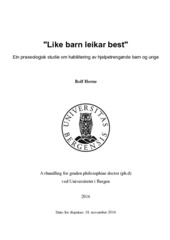| dc.contributor.author | Horne, Rolf | en_US |
| dc.date.accessioned | 2016-12-19T09:05:14Z | |
| dc.date.available | 2016-12-19T09:05:14Z | |
| dc.date.issued | 2016-11-18 | |
| dc.identifier.isbn | 978-82-308-3210-3 | en_US |
| dc.identifier.uri | https://hdl.handle.net/1956/15253 | |
| dc.description.abstract | This thesis examines social practices in habilitation of children in Norwegian municipalities and specialised health services. The view on and approach to disabled children have changed through time, and the social reality, which seems natural and taken for given, is socially constructed. In our time, habilitation is part of the medical field and is dominated by the logic of medicine legitimised by the state. The thesis seeks new insight through the following research question: Which social practices are created and employed in the meeting between parents and professionals in habilitation of children who are dependent of help, where do these practices come from, and how do they structure the opportunities for parents to get help? The study takes a praxeological approach, which combines the subjectivistic with the objectivistic and thus constructs the research object. The meeting between parents and professionals is understood as social relations, and the thesis breaks with predefined understandings of reality. Data were collected through interviews and questionnaires. Three pairs of parents with disabled children and nine professionals from three municipalities and one habilitation department participated in the study in 2011. The analysis used a theoretical-empirical, reflexive methodology based on the theory and concepts of the French sociologist Pierre Bourdieu’s trilogy of habitus and field analysis. The dispositions and social positions of the agents were re-constructed and used to describe and analyse their social practices, in the form of diagnose and monitoring of and research on the children. Then, the field of children who are dependent of help were re-constructed, analysing the power relations between the positions. The field analysis showed that depending on their capital, parents of disabled children are in a more or less dependant and dominated position. Professionals possessing specialised capital related to the medical logic dominate the field. Thus, the historically created power relation between agents in the field of children who are dependent of help structures a relation of domination, where parents with low levels of capital have the greatest social distance<br /> to the helpers and the least opportunities to get help. | en_US |
| dc.description.abstract | Denne avhandling undersøker sosiale praktikkar i habilitering av barn og unge i regi av norske kommunar og spesialisthelseteneste. Handsaminga av funksjonshemma barn og unge har endra seg gjennom tidene, og den sosiale røyndommen, som til ei kvar tid verkar naturleg og sjølvsagt, er sosialt konstruert. I vår tid er habilitering ein del av det medisinske felt og dominert av ein medisinsk logikk, som er legitimert av staten. Avhandlinga søker ny kunnskap om dette området med fylgjande forskingsspørsmål: Kva sosiale praktikkar skapast og setjast i verk i møte mellom foreldre og fagpersonar innan habilitering av hjelpeavhengige barn og unge, kor kjem desse praktikkane frå, og korleis strukturerer dei foreldra sine muligheiter for å få hjelp? Avhandlinga er ein praxeologisk undersøking, som kombinerer det subjektivistiske med det objektivistiske og der igjennom konstruerer forskingsobjektet. Det leggjast eit relasjonelt perspektiv over møte mellom foreldre og fagprofesjonelle og brytast med førehandsdefinerte forståingar av røyndommen. Avhandlinga byggjer på data frå intervju og spørjeskjema. Tre par foreldre med funksjonshemma barn og ni fagprofesjonelle frå tre kommunar og ein habiliteringsavdeling på eit sjukehus deltok i undersøkinga i 2011. Analysen er gjort ut frå teoretisk-empirisk, refleksiv metodologi med utgangspunkt i teori og tilhøyrande omgrep frå den franske sosiologen Pierre Bourdieu sin habitustrilogi og feltanalyse. Agentane sine disposisjonar og sosiale posisjonar er rekonstruert og brukt til å beskrive og analysere dei sosiale praktikkar posisjonane set i verk, i form av mellom anna diagnostisering og oppfølging av og forsking på barna. Feltet for hjelpeavhengige barn og unge er deretter rekonstruert ved å analysere styrkeforholdet og relasjonane mellom posisjonane. Feltanalysen viser at foreldre er i ein meir eller mindre avhengig og dominert posisjon avhengig av deira kapital, og at fagprofesjonelle, som innehar spesialisert kapital knytt til medisinsk logikk, dominerer i feltet. Det historiske skapte styrkeforholdet mellom agentane i feltet for hjelpeavhengige barn og unge strukturerer dermed eit dominansforhold, der foreldre med låg kapital har størst sosial avstand til dei som skal hjelpe og minst muligheit for å få hjelp. | no_NO |
| dc.language.iso | nno | eng |
| dc.publisher | The University of Bergen | eng |
| dc.subject | Foreldre | |
| dc.subject | Barn og unge | |
| dc.subject | Funksjonshemming | |
| dc.subject | Sosial praktikk | |
| dc.subject | Felt | |
| dc.subject | Habitus | |
| dc.subject | Fagprofesjonelle | |
| dc.subject | praxeologi | eng |
| dc.subject | habilitering | eng |
| dc.subject | symbolsk makt | eng |
| dc.subject | Bourdieu | eng |
| dc.subject | familie | eng |
| dc.subject | konstruksjon | eng |
| dc.subject | medisin | eng |
| dc.subject | sosial praktikk | eng |
| dc.title | ”Like barn leikar best”. Ein praxeologisk studie om habilitering av hjelpetrengande barn og unge | en_US |
| dc.type | Doctoral thesis | |
| dc.rights.holder | Copyright the Author. All rights reserved | |
| dc.identifier.cristin | 1404898 | |
